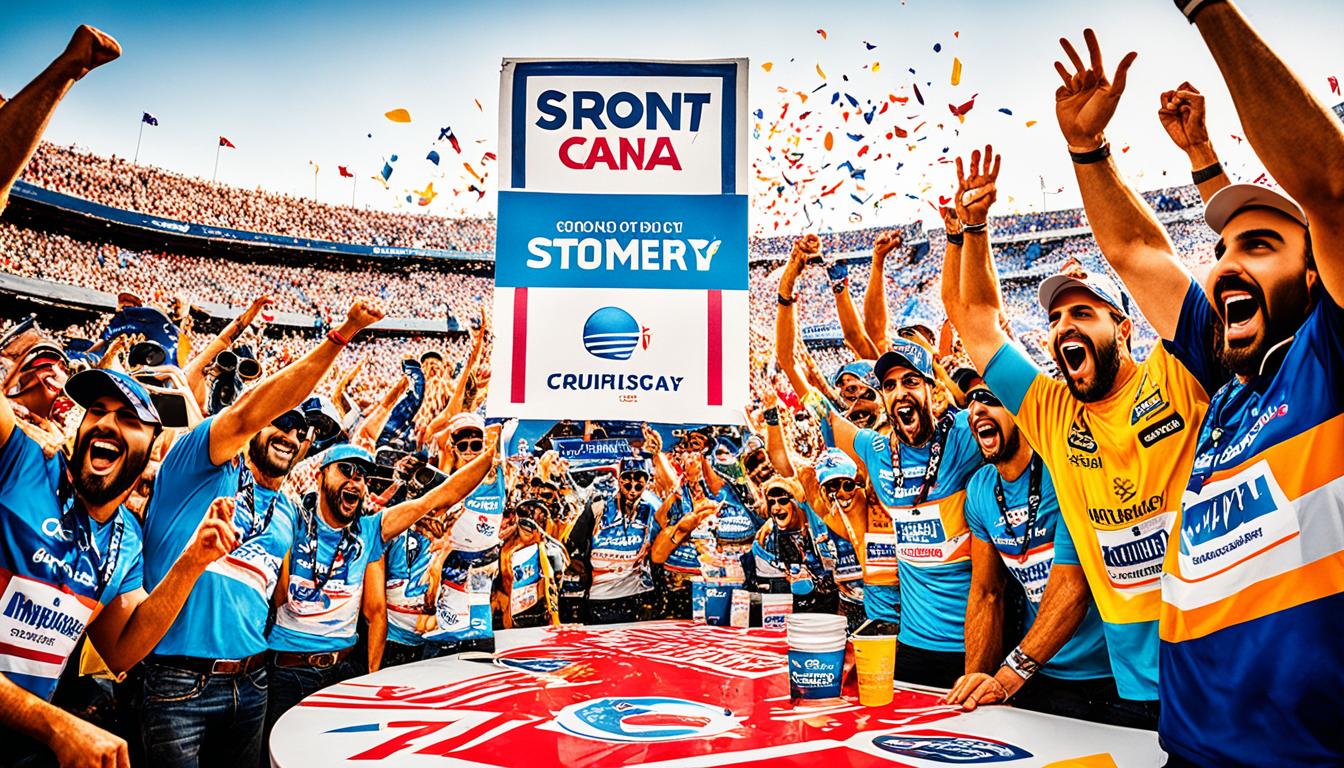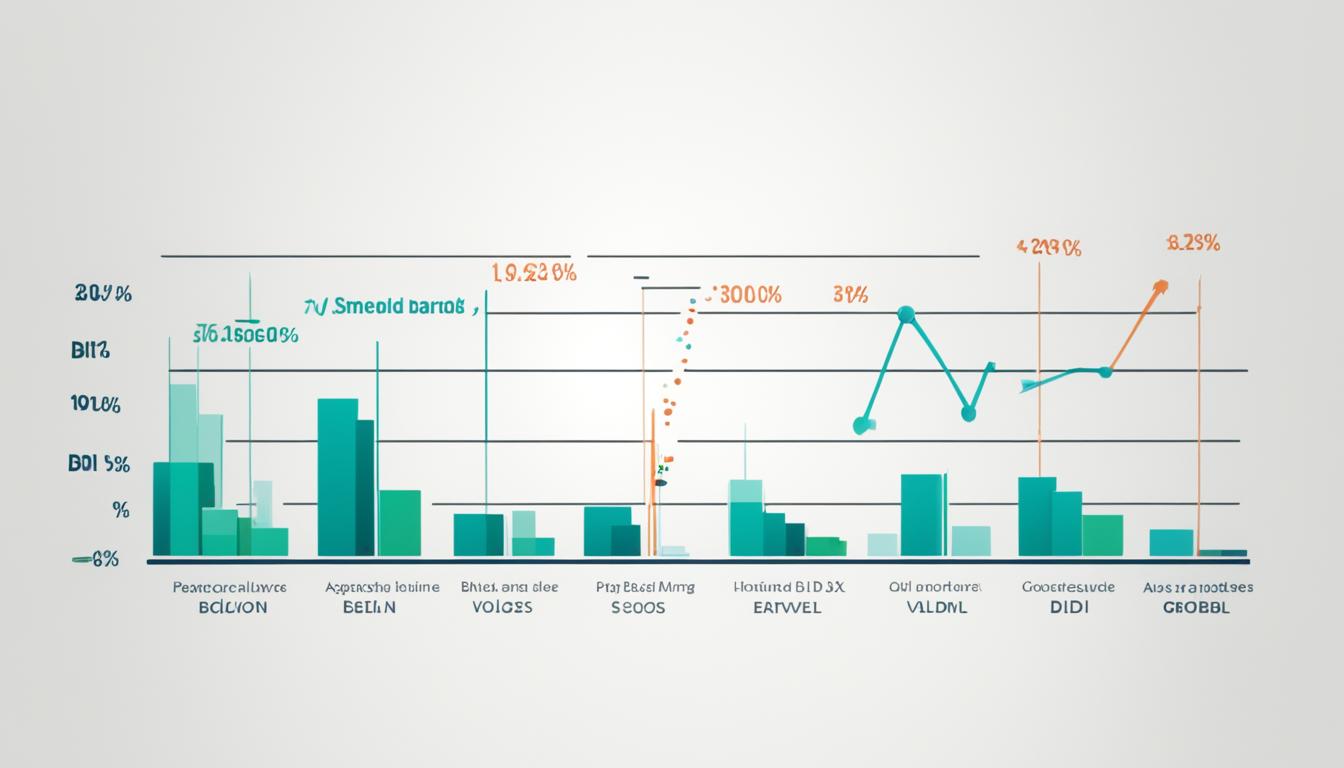EasyJet is a leading European low-cost airline that has successfully implemented a comprehensive marketing strategy to gain a competitive edge in the industry. With a focus on innovative branding, strategic promotion, and digital marketing tactics, EasyJet has been able to attract a large customer base and increase its market share in the budget carrier segment. Additionally, the airline has implemented customer loyalty programs and market penetration strategies to further solidify its position as a prominent player in the low-cost aviation market.
Key Takeaways:
- EasyJet has implemented a comprehensive marketing strategy to gain a competitive advantage in the low-cost airline market.
- The airline focuses on innovative branding, strategic promotion, and digital marketing tactics to attract customers and increase market share.
- EasyJet has successfully implemented customer loyalty programs and market penetration strategies to enhance its marketing efforts.
- The company’s marketing strategy has contributed to its success and market dominance in the low-cost airline industry.
- EasyJet’s customer-centric approach and focus on customer satisfaction have fostered customer loyalty and contributed to its market dominance.
EasyJet’s Origins and Branding Strategy
EasyJet, founded in 1995 by Stelios Haji-loannou, established itself as a prominent player in the European low-cost airline industry. Inspired by the successful low-cost, no-frills model of Southwest Airlines, EasyJet sought to revolutionize air travel by offering affordable fares without compromising quality.
To develop its brand image, EasyJet enlisted the expertise of a renowned brand consultancy. This strategic partnership aimed to create a strong and distinct brand identity that would resonate with travelers seeking affordable travel options. As a result, the consultancy devised the name “EasyJet,” capturing the airline’s commitment to simplifying travel and providing accessible services.
An integral part of EasyJet’s branding strategy is its iconic brand logo. The company collaborated with a design consultancy called White Knight to create a brand logo that would effectively communicate its values. The result was the now-famous EasyJet brand logo, featuring a vibrant shade of orange known as Pantone 021C. This distinctive color choice evokes a sense of energy, excitement, and affordability, reinforcing EasyJet’s unique positioning in the market.
To promote its brand and increase brand awareness, EasyJet launched a simple yet effective advertising campaign. By focusing on clear and concise messaging, the campaign conveyed the key benefits of choosing EasyJet for travel, including low fares and a hassle-free experience. This strategic approach allowed EasyJet to establish itself as a trusted and recognizable brand within the competitive low-cost airline market.
EasyJet’s Branding Strategy Overview:
- Founded in 1995, inspired by Southwest Airlines’ low-cost, no-frills model.
- Collaborated with a brand consultancy to develop a compelling brand image.
- Adopted the name EasyJet to reflect the airline’s commitment to simplicity.
- Created a distinctive brand logo in partnership with a design consultancy.
- Utilized the iconic shade of orange, Pantone 021C, to enhance brand recognition.
- Launched an advertising campaign emphasizing low fares and hassle-free travel.
| Aspect | Description |
|---|---|
| Founding Year | 1995 |
| Brand Consultancy | Collaborated with a renowned brand consultancy |
| Brand Name | Developed the brand name “EasyJet” |
| Brand Logo | Created a distinctive brand logo with White Knight |
| Brand Color | Adopted Pantone 021C as the iconic brand color |
| Advertising Campaign | Deployed an effective advertising campaign |
EasyJet’s Innovation and Online Sales Strategy
EasyJet has been a pioneer in the airline industry, revolutionizing the way airlines conduct their sales and bookings. The company’s foresight and commitment to innovation have positioned it as a leader in the online sales arena.
In 1997, EasyJet took a bold step by launching its website, easyjet.com. This strategic move proved to be a game-changer, as it provided customers with an accessible and convenient platform to make their bookings directly online. The website quickly gained popularity, becoming a major sales channel for the airline.
With the introduction of internet bookings, EasyJet experienced rapid growth in its online sales. By 2001, online bookings accounted for a remarkable 80% of total sales, a milestone unmatched by any other airline at the time. This high proportion of online sales underscored EasyJet’s dominance in the digital space and its ability to effectively reach a broad customer base.
The Success of EasyJet’s Online Sales Strategy
EasyJet’s online sales strategy has been instrumental in its continuous growth and market share expansion. By capitalizing on the power of the internet, the airline has been able to tap into a vast customer base and generate substantial revenue.
The launch of their user-friendly website enabled EasyJet to offer a seamless booking experience to customers, allowing them to easily search for flights, compare fares, and make instant online transactions. This convenience and accessibility played a significant role in attracting and retaining customers.
Moreover, the airline’s commitment to embracing technological advancements and leveraging online platforms has enabled it to adapt to changing customer preferences and behavior. By staying ahead of the curve, EasyJet remains a formidable force in the travel industry.
Driving Growth and Market Share through Online Sales
The remarkable success of EasyJet’s online sales strategy has not only increased its revenue but has also allowed the airline to expand its market share. By embracing the digital landscape, EasyJet has effectively penetrated the market and gained a competitive edge.
Online sales have provided EasyJet with the opportunity to reach a diverse range of customers, including tech-savvy millennials and frequent travelers who prefer the convenience of online transactions. This wide customer base has propelled the airline’s market presence and contributed to its sustained growth.
As the airline industry continues to evolve, EasyJet remains committed to innovation and continuous improvement. By prioritizing online sales and investing in cutting-edge technology, the airline ensures its position as a frontrunner in the digital revolution.
EasyJet’s Financial Performance and Market Expansion
Since its listing on the London Stock Exchange in 2000, EasyJet has consistently delivered strong financial performance, solidifying its position as a leading player in the low-cost airline industry. The company’s successful listing has attracted significant investment from international companies, bolstering its financial stability and allowing for further market expansion.
This international investment has not only provided EasyJet with a strong financial foundation but has also opened doors for strategic partnerships and collaborations. Through these alliances, EasyJet has been able to leverage the expertise and resources of international investors to drive market growth and expansion.
In addition to attracting investments, EasyJet has implemented measures to lower administration costs, enabling the company to operate more efficiently and allocate resources effectively. By leveraging electronic infrastructure and implementing streamlined processes, EasyJet has reduced administrative overheads, leading to improved profitability and financial performance.
Market Expansion Through Strategic Investments and Acquisitions
EasyJet’s commitment to market expansion is evident through its strategic investments and acquisitions. The company has made strategic decisions to acquire other airlines, routes, and airport slots, strengthening its market presence and increasing its competitive advantage.
Through these strategic moves, EasyJet has been able to broaden its network and offer its customers an extensive range of destinations. This market expansion has allowed EasyJet to cater to a wider customer base, attract new customers, and foster customer loyalty.
| Year | Acquisition/Investment | Impact |
|---|---|---|
| 2017 | Acquisition of Air Berlin assets | Expanded route network and increased market share |
| 2013 | Investment by Stelios Haji-loannou | Enhanced financial stability and growth opportunities |
| 2002 | Acquisition of Go Fly | Increased market dominance and synergies |
EasyJet’s market expansion efforts have positioned the company as one of the leading low-cost airlines in Europe. By strategically investing in lucrative routes and acquiring valuable assets, EasyJet continues to strengthen its market position and create opportunities for sustained growth.
EasyJet’s Competitive Advantage and Differentiation Strategy
EasyJet has successfully established a competitive advantage through its cost leadership strategy and innovative business model. By focusing on low-cost operations and a no-frills service approach, EasyJet has been able to attract price-conscious customers who prioritize affordable travel options. The airline’s commitment to providing reliable and convenient travel experiences has also enhanced its competitive position.
One of EasyJet’s key competitive advantages lies in its online sales model. The company recognized early on the potential of the internet as a powerful platform for sales and customer engagement. By investing in a user-friendly website and robust online booking system, EasyJet has streamlined the ticketing process, resulting in cost savings and efficient operations.
Furthermore, EasyJet’s commitment to a no-frills service model allows the airline to optimize its cost structure and offer competitive fares. By adopting a simplified approach to airline travel, EasyJet eliminates unnecessary expenses, such as complimentary meals and extensive in-flight services. This cost-conscious strategy enables the company to maintain low prices and attract a wide customer base.
EasyJet’s differentiation strategy also revolves around its strong customer focus. The company places great emphasis on understanding and fulfilling its customers’ needs and preferences. By offering reliable and affordable travel options, EasyJet has built a reputation for providing value and convenience to its passengers.
Customer-Centric Approach
EasyJet’s customer focus extends beyond just pricing. The airline consistently strives to enhance customer satisfaction by providing outstanding service and addressing customer pain points. By offering a hassle-free travel experience and prioritizing punctuality, EasyJet has garnered a loyal customer base that appreciates its customer-centric approach.
To further cater to its customers’ needs, EasyJet has also introduced ancillary services such as seat selection and additional baggage allowance. These optional services allow customers to customize their travel experience while generating additional revenue for the airline.
Overall, EasyJet’s competitive advantage lies in its cost leadership strategy, efficient online sales model, no-frills service approach, and unwavering commitment to customer satisfaction. By continuously refining its business model and innovating in the low-cost airline industry, EasyJet has solidified its position as a leading player in the European aviation market.
EasyJet’s Value Proposition and Target Market
EasyJet understands the importance of delivering value to its customers. With a focus on consistent and reliable service, EasyJet aims to provide good value for money with its affordable fares. The airline targets both business and leisure travelers, catering to their specific needs and preferences.
For business travelers, EasyJet offers flexibility, allowing them to easily plan their trips according to their schedules. The airline’s extensive network of routes across Europe and beyond ensures that business travelers have convenient options to reach their destinations.
On the other hand, EasyJet also appeals to leisure travelers by providing cost savings and enjoyable travel experiences. With affordable fares, leisure travelers can explore various destinations without breaking the bank. EasyJet’s wide network of routes allows leisure travelers to choose from a diverse range of destinations, whether it’s a relaxing beach getaway or an adventurous city exploration.
EasyJet positions itself as a European low-cost airline, providing value and convenience to a broad customer base. The company’s target market consists of individuals who prioritize value for money and seek hassle-free and reliable travel options. By focusing on the needs and preferences of its target market, EasyJet has created a strong value proposition that resonates with both business and leisure travelers.
EasyJet’s Pricing Strategy and Revenue Generation
EasyJet adopts a strategic pricing approach that focuses on optimizing revenue generation through its innovative pricing strategy. This strategy is centered around one-way ticketing, with prices for flights initially starting at a lower level and gradually increasing as the departure date approaches. By implementing dynamic pricing, EasyJet aims to maximize profitability while still providing competitive fares for its customers.
One of the key components of EasyJet’s pricing strategy is the utilization of dynamic pricing. This approach allows the airline to adjust ticket prices based on a variety of factors, such as demand, availability, and market conditions. By constantly monitoring and analyzing these variables, EasyJet can dynamically set prices to capture the maximum potential revenue for each flight.
To attract customers and promote bookings, EasyJet also offers discounts and flexible booking options. These discounts can be in the form of promotional offers or special rates for certain travel periods or destinations. By creating incentives for customers to book with EasyJet, the airline can increase passenger volume and overall revenue.
Furthermore, EasyJet’s flexible booking options are designed to accommodate the varying needs of its customers. Passengers have the freedom to modify booking dates, times, and even routes, providing them with a convenient and hassle-free travel experience. This flexibility not only enhances customer satisfaction but also contributes to revenue generation by encouraging repeat bookings and customer loyalty.
It is important to note that EasyJet’s pricing strategy is not solely focused on generating revenue. The airline also aims to strike a balance between providing affordable fares and maximizing profitability. By offering competitive fares through dynamic pricing and leveraging discounts and flexible booking options, EasyJet is able to cater to a wide range of travelers while still ensuring a sustainable business model.
Revenue Generation Breakdown
To provide a comprehensive understanding of EasyJet’s revenue generation, the table below outlines the different sources contributing to the airline’s overall financial performance:
| Revenue Source | Percentage of Total Revenue |
|---|---|
| Passenger Ticket Sales | 75% |
| Ancillary Revenue (In-flight Sales, Baggage Fees, etc.) | 20% |
| Other Revenue (Charter Services, Cargo, etc.) | 5% |
By diversifying its revenue streams through ancillary services and additional revenue sources, EasyJet ensures a solid financial foundation while maintaining a customer-centric approach.
EasyJet’s Customer Service and Experience
EasyJet is committed to providing exceptional customer service and ensuring a positive travel experience for passengers. The airline has implemented various strategies to differentiate itself in terms of customer service and enhance overall customer satisfaction.
On-Board Food Sales and Cabin Crew Commission
One of the ways EasyJet sets itself apart is through its on-board food sales. Passengers have the option to purchase a variety of snacks and beverages during their flight, allowing them to enjoy refreshments and satisfy their cravings while in the air. This offering enhances the overall travel experience and provides convenience to passengers.
Cabin crew members play a vital role in delivering exceptional customer service on EasyJet flights. To incentivize excellent service, cabin crew members receive a commission for food sales, which encourages them to provide attentive and friendly service to passengers. This commission-based system ensures that crew members are motivated to meet the needs and exceed the expectations of customers.
Rapid Turnaround Time and Efficient Operations
EasyJet places great importance on rapid turnaround times, aiming for efficient operations that minimize delays while maximizing customer satisfaction. By streamlining processes and optimizing procedures, EasyJet ensures that passengers experience minimal waiting times between flights, allowing for seamless connections and timely departures.
Customer Satisfaction and Loyalty
Through its customer-centric approach, EasyJet strives to deliver exceptional service that exceeds customer expectations. The airline values customer feedback and works continuously to improve its services based on customer input. This commitment to customer satisfaction fosters loyalty, as passengers choose EasyJet for their future travel needs, knowing they will receive reliable service and a positive experience.
EasyJet’s efforts to prioritize customer service and provide an excellent travel experience have contributed to its positive reputation and loyal customer base. By focusing on on-board food sales, cabin crew commission, rapid turnaround times, and overall customer satisfaction, EasyJet ensures that passengers have a memorable and pleasant journey from start to finish.
Conclusion
EasyJet’s marketing success and market dominance in the low-cost airline industry can be attributed to the company’s strategic implementation of marketing strategies. Through effective branding, online sales, differentiation, and customer service, EasyJet has achieved a competitive advantage over its rivals. The airline’s focus on customer satisfaction and value proposition has further contributed to customer loyalty, solidifying its position as a market leader.
By leveraging its branding strategy, EasyJet has established a strong and recognizable brand in the industry. The company’s distinct orange logo and simple advertising campaigns have helped to differentiate EasyJet from its competitors, attracting customers and building brand loyalty.
Furthermore, EasyJet’s online sales strategy has provided a significant competitive advantage. The company’s early adoption of online booking platforms and the high proportion of online sales have allowed EasyJet to reach a wide customer base and increase its market share. This emphasis on digital marketing has enabled the airline to efficiently target and engage its target audience, strengthen its competitive position, and drive revenue growth.
EasyJet’s commitment to customer satisfaction and its value proposition have played a pivotal role in its marketing success. By consistently delivering reliable service at affordable fares, EasyJet has been able to attract both business and leisure travelers. This customer focus and dedication have fostered loyalty among its customer base, leading to repeat business and positive word-of-mouth recommendations. As a result, EasyJet’s marketing success has translated into market dominance and a strong position within the low-cost airline industry.






